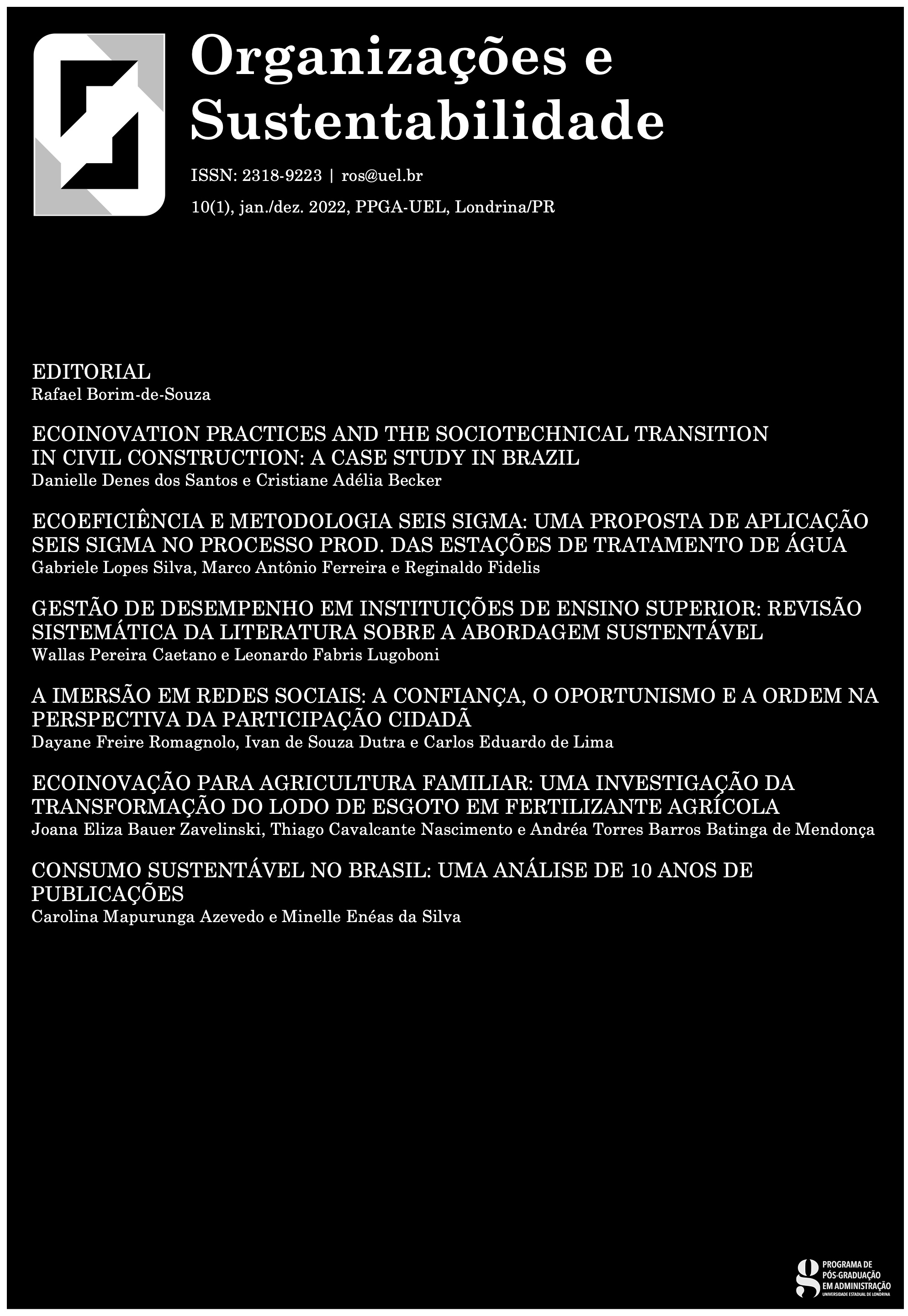PRÁTICAS DE ECOINOVAÇÃO E A TRANSIÇÃO SOCIOTÉCNICA NA CONSTRUÇÃO CIVIL
UM ESTUDO DE CASO NO BRASIL
DOI:
https://doi.org/10.5433/2318-9223.2022v10n1p3-25Keywords:
Construção, Mudança Tecnológica, Escolhas e Consequências, Processo de DifusãoAbstract
O mundo é sensível ao consumo desenfreado que impacta na sustentabilidade. A ecoinovação tem se mostrado uma abordagem que busca entender as inovações sustentáveis como alternativa ao desenvolvimento econômico das sociedades. A principal contribuição deste artigo é descrever como o sistema de práticas de ecoinovação foi desenvolvido no processo de transição sociotécnica para a sustentabilidade em uma construtora. A partir de uma abordagem qualitativa, descrevemos como as práticas de ecoinovação são desenvolvidas em uma empresa de construção com teoria sociotécnica e teoria da prática social. Essa análise permitiu entender o desenvolvimento das práticas de eco inovação, considerando pontos que retardam ou estimulam a transição para a sustentabilidade. Os resultados mostraram algumas interseções com nicho, regime e paisagem, muitas delas estimulando a sustentabilidade e outras desacelerando. Incluímos também uma ampliação da teoria ao mostrar que as intersecções que estimulam são mais organizadas nas práticas, e as que retardam encontram fortes barreiras no regime.
Downloads
References
Aloise, P. G., Nodari, C. H., & Dorion, E. C. H. (2016). Ecoinovações: um ensaio teórico sobre conceituação, determinantes e achados na literatura. Interações, 17(2). DOI: https://doi.org/10.20435/1984042X2016211
Azevedo J., Azevedo V., & Santos C. A. C. (2019). Aplicação da análise fatorial para determinação da vulnerabilidade socioeconômica e ambiental nos municípios do Estado da Paraíba. Revista Ibero-Americana de Ciências Ambientais, 10(4). DOI: https://doi.org/10.6008/CBPC2179-6858.2019.004.0008
Boons, F., & Lüdeke-Freund, F. (2013). Business models for sustainable innovation: state-of-the-art and steps towards a research agenda. Journal of Cleaner Production, 45, 9-19. DOI: https://doi.org/10.1016/j.jclepro.2012.07.007
Carrillo-hermosilla, J., Gonzáles, P. D. R., & Könnölä, T. (2009). Eco-Innovation: When Sustainability and Competitiveness Shake Hands. New York, NY: Palgrave Macmillan. DOI: https://doi.org/10.1057/9780230244856
CBIC (2015). Câmara Brasileira da Indústria da Construção. Recuperado de: http://www.cbicdados.com.br/home/. Acesso em 14 de dezembro de 2022.
Corazza, R. I., & Fracalanza, P. S. (2004). Caminhos do Pensamento neo-schumpeteriano: para além das analogias biológicas. Nova Economia, 14(4), 127-155.
Dutra, C., & Tudor, T. (2016). Challenges to advancements in transition research on paradigmatic grounds. IST2016 International Sustainability Wuppertal, Germany.
Elsen, B.; Geels, F. W.; Green, K. (2004) Understanding system innovations: a critical literature review and a conceptual synthesis. In System Innovation and the Transition to Sustainability: Theory, Evidence and Policy. Edward Elgar.
Geels, F. W. (2002). Technological transitions as evolutionary reconfiguration processes: a multi-level perspective and a case study. Research Policy, 31(8-9), 1257-1274. DOI: https://doi.org/10.1016/S0048-7333(02)00062-8
Geels, F. W. (2005). Transitions, transformations and reproduction: dynamics in socio-technical systems. In Druid Tenth Anniversary Summer Conference, 2005, Copenhagen, Denmark, 27-29 de jun., 2005.
Geels, F. W. (2010). Ontologies, socio-technical transitions (to sustainability), and the multi-level perspective. Research Policy, 39, p. 495-510. DOI: https://doi.org/10.1016/j.respol.2010.01.022
Geels, F. W. (2011). The multi-level perspective on sustainability transitions: Responses to seven criticisms. Environmental Innovation and Societal Transitions, 1(1), 24-40. DOI: https://doi.org/10.1016/j.eist.2011.02.002
Geels, F. W., & Kemp, R. (2005). Transitions, Tranformations and Reproduction: Dynamics in Socio-Technical Systems. DRUID Tenth Anniversary Summer Conference, Copenhague, Dinamarca. DOI: https://doi.org/10.1093/0199290474.003.0009
Geels, F. W., & Kemp, R. (2007). Dynamics in socio-technical systems: typology of change processes and contrasting case studies. Technology in Society, 29, p. 441-455. DOI: https://doi.org/10.1016/j.techsoc.2007.08.009
Geels, F. W., & Schot, J. (2007). Typology of sociotechnical transition pathways. Research Policy, 36, p. 399-417. DOI: https://doi.org/10.1016/j.respol.2007.01.003
Harada K. (2016). Direito financeiro e tributário. Atlas
Hargreaves T., Haxeltine A., Longhurst N. & Seyfang G. (2011). Sustainability transitions from the bottom-UP: Civil Society, The Multi-Level Perspective and Practice Theory. CSERGE.
Hargreaves, T., Longhurst, N., & Seyfang, G. (2012). Understanding Sustainability Innovations: points of intersection between the Multi-‐Level Perspective and Social Practice Theory. 3S Working Paper 2012-03. Norwich: Science, Society and Sustainability Research Group.
Hölsgens, H. N. M. (2016). Energy Transitions in the Netherlands: Sustainability Challenges in a Historical and Comparative Perspective. University of Groningen, SOM research school.
Kuabara, F. H. S., Rese, N., & Villar, J. M. F. (2015). O vir a ser da estratégia: a história de como a estratégia torna-se uma prática social. In XXXIX Encontro da ANPAD. Anais [...] Belo Horizonte/MG, 13 a 16 de setembro de 2015.
Kemp, R., & Rotmans, J. (2010). The management of the co-evolution of technical, environmental and social systems. In M. Weber, & J. Hemmelskamp (Eds.), Towards Environmental Innovation Systems (pp. 33-55). Berlin: Springer. DOI: https://doi.org/10.1007/3-540-27298-4_3
Merriam, S. B. (2009). Qualitative Research: a guide to design and implementation. San Francisco, CA: John Wiley & Sons.
Nelson, R. R., & Winter S. G. (1982). An Evolutionary Theory of Economic Change. Cambridge, Mass.: Harvard University Press
Nicolini, D. (2009). Zooming in and out: studying practices by switching theoretical lenses and trailing connections. Organization Studies, 30(12), 1391-1418. DOI: https://doi.org/10.1177/0170840609349875
Pegels, A., & Altenburg, T. (2012). Sustainability-oriented innovation systems – managing the green. Transformation Innovation and Development 2(1), 5-22. DOI: https://doi.org/10.1080/2157930X.2012.664037
Reckwitz, A. (2002). Toward a theory of social practices: a development in culturalist theorizing. European Journal of Social Theory, 5(2), 243-263. DOI: https://doi.org/10.1177/13684310222225432
Reid, A., & Miedzinski, M. (2008) Eco-Innovation: Final Report for sectoral innovation Watch. Systematic Eco-Innovation Report, 1-3.
Santos, L. L.da S., & Silveira, R. A. da (2015). Por uma Epistemologia das Práticas Organizacionais: a contribuição de Theodore Schatzki, Organizações & Sociedade. 22 (72). DOI: https://doi.org/10.1590/1984-9230724
Schatzki, T. R. (2001). Introduction: practice theory. In T. R. Schatzki, K. K. Cetina, & E. Savigny (Eds.), The practice turn in contemporary. London: Routledge.
Schatzki, T. R. (2010). Materiality and social life. Nature and Culture, 5(12), 123-149. DOI: https://doi.org/10.3167/nc.2010.050202
Shove, E. (2003). Comfort Cleanliness and Convenience: the social organization of normality. Oxford: Berg.
Shove, E. (2005). Changing human behaviour and lifestyle: a challenge for sustainable consumption? In I. Ropke, & L. Reisch (Eds.), Consumption - Perspectives from ecological economics. Cheltenham: Elgar, 111-132 – 22 ps.
Smith, A., Voβ, J-P., & Grin, J. (2010). Innovation studies and sustainability transitions: the allure of the multi-level perspective and its challenges. Research Policy, 39. DOI: https://doi.org/10.1016/j.respol.2010.01.023
Stake, R. (2010). Qualitative Research Studying How Things Works. Nova York: Research Methodology.
Sumner, J. (2015). The Green City Index: A summary of the Green City Index research series. Siemens AG.
Wagner, M. (2010). The role of corporate sustainability performance for economic performance: a firm-level analysis of moderation effects. Ecological Economics 69(7), 1553-1560. DOI: https://doi.org/10.1016/j.ecolecon.2010.02.017
Watson, M. (2012). Como as teorias de prática pode informar transição para um sistema de transporte sem carbono. Journal of Transport, 24 , 488-496.
Downloads
Published
How to Cite
Issue
Section
License
Copyright (c) 2022 Organizações e Sustentabilidade

This work is licensed under a Creative Commons Attribution-NonCommercial-NoDerivatives 4.0 International License.
O(s)/a(s) autor(es)/autora(s) transfere(m) todos os direitos autorais do artigo para a revista Organizações e Sustentabilidade, sendo vedada qualquer reprodução, total ou parcial, em qualquer meio de divulgação, impresso ou eletrônico, sem que a prévia e necessária autorização seja solicitada e, se obtida, fará constar o competente registro e agradecimento à revista.














